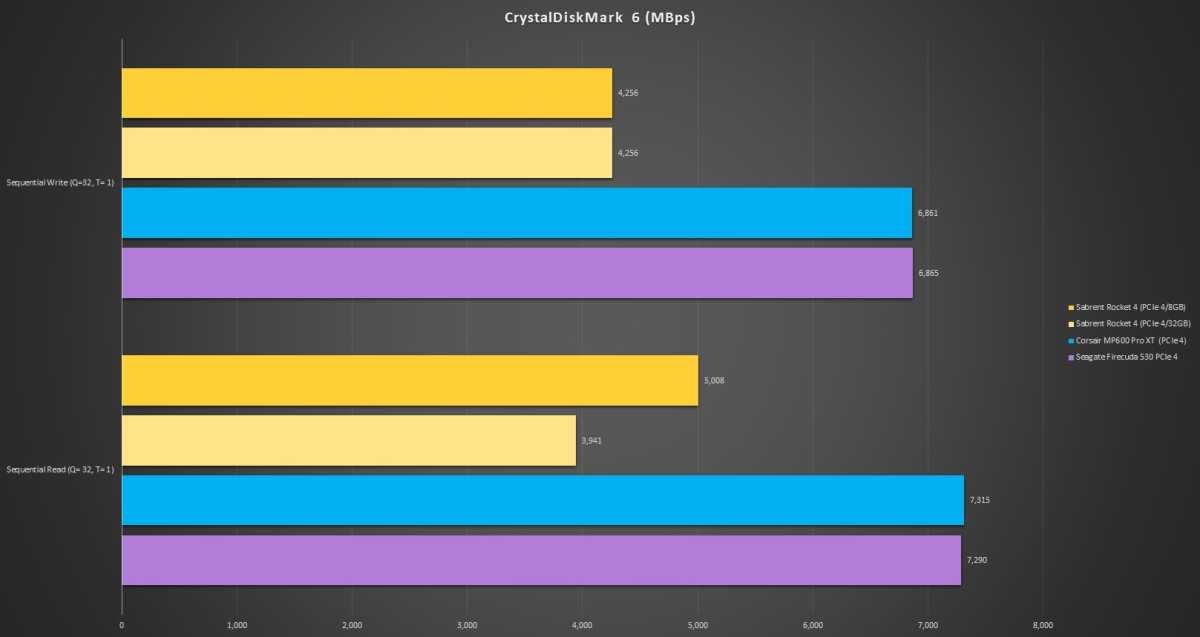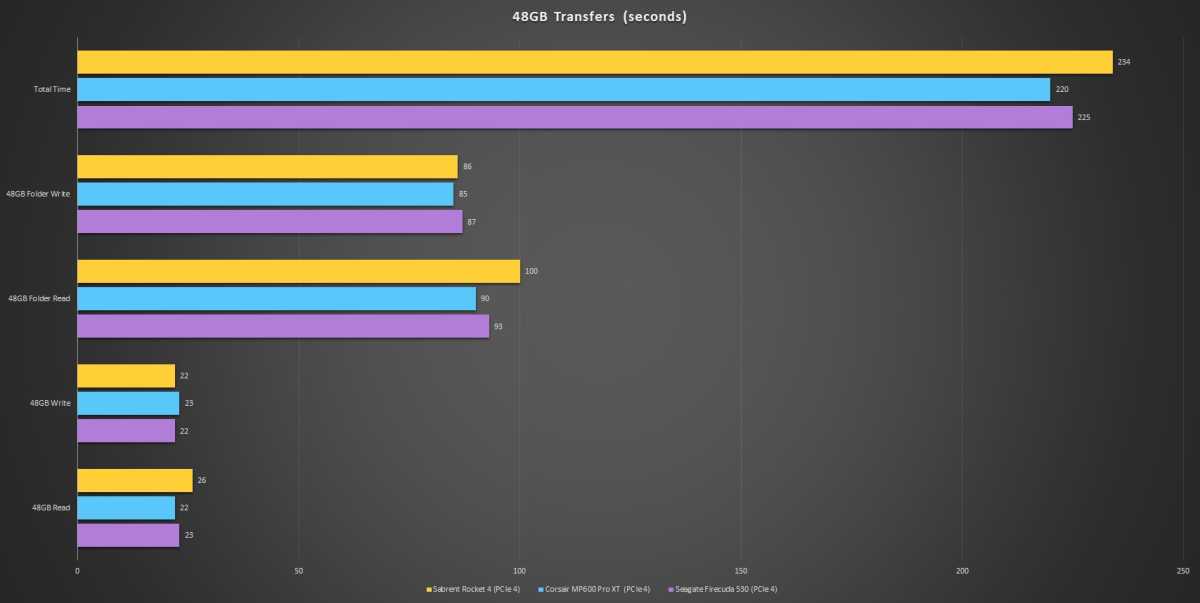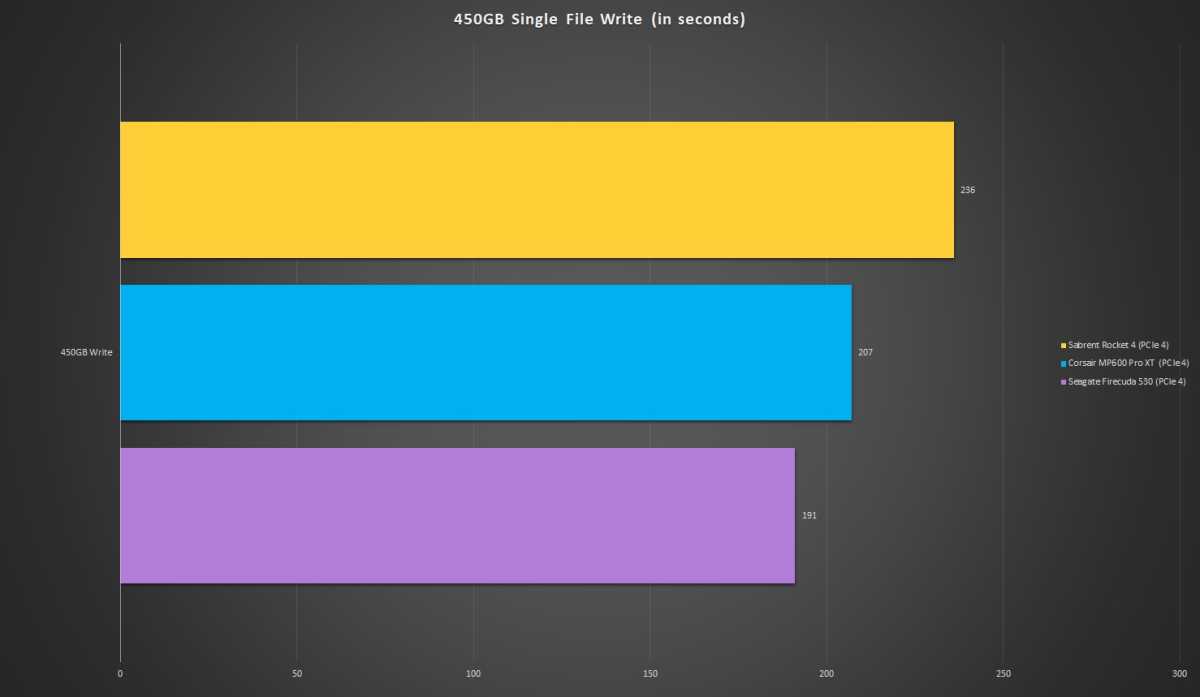At a glance
Expert’s Rating
Pros
- Good PCIe 3 performance
- Nice packaging
- A cheap option for the PS5
Cons
- PCIe 4 performance is 2.5GBps off the modern pace
Our Verdict
The Sabrent Rocket 4 is well behind the PCIe 4 curve in benchmarks, but still delivers good real world performance. A cheap option for your PS5.
Best Prices Today

$89.98
Free
Sabrent’s Rocket 4 was one of the first PCIe 4 SSDs out of the gate. It’s not even close to newer PCIe 4 NVMe SSDs on sustained throughput benchmarks.
Don’t let that fool you however. The Sabrent Rocket 4’s real world performance is surprisingly good, even when compared to the top dogs. If you’re looking for a cheaper PCIe 4 option, or an SSD that would pair nicely with your PlayStation 5, this might be a good choice.
This review is part of our ongoing roundup of the best SSDs. Go there for information on competing products and how we tested them.
Design and specs
The Rocket 4 is a standard 2280 (22mm wide, 80 mm long) M.2/NVMe SSD using four PCIe 4 lanes. The NAND is Toshiba BiC S4 96-Layer TLC and the controller a Phison E16. There’s a gigabyte of DRAM cache on the 2TB capacity we tested, and the drive was going for $300 on Amazon at the time of this review.
There are also $90/500GB and $150/1TB models available. Nicely, there’s a 1800TBW (TeraBytes Written) per 1TB of capacity rating which is quite a bit more than with most drives. The warranty is five years, assuming you don’t overshoot the TBW rating which few (if any users) will ever do.
Performance
We saw the 5GBps read performance Sabrent claimed, but we also experienced many significantly slower read runs over PCIe 4 (3.2GBps reading). Basically, with 10GB or less employed by our CrystalDiskMark or AS SSD testing software, we saw a hair over 5GBps. With the 32GB test that we normally run on CrystalDiskMark, we saw anywhere from 2.8GBps to 4.2GBps read performance.
This is likely a secondary caching issue (NAND as SLC) but it might also be the way the benchmark is set up. We included both the 8GB and 32GB tests below so you can see the issue. Note that the drives we compare it to are two of the three absolute fastest SSDs on the market (the other being Kingston’s KC3000).

After the benchmarks, the times in our 48GB real world transfers were a more than pleasant surprise. You might call them redemptive. This has a lot to do with the limits of operating systems.

Another pleasant surprise was the the Rocket 4’s 450GB write time–the ninth fastest we’ve seen. This test reveals secondary cache issues, but the Rocket 4 was largely free of these.
Note that as the drive fills up, NAND for cache dries up and this type of test proceeds at the native speed of the NAND.

There’s no reason to spend this type of money if you’re using PCIe 3. But just in case, the Rocket 4’s performance was slightly above the PCIe 3 average.
The PCIe 3 tests utilize Windows 10 64-bit running on a Core i7-5820K/Asus X99 Deluxe system with four 16GB Kingston 2666MHz DDR4 modules, a Zotac (NVidia) GT 710 1GB x2 PCIe graphics card, and an Asmedia ASM3242 USB 3.2×2 card. It also contains a Gigabyte GC-Alpine Thunderbolt 3 card, and Softperfect Ramdisk 3.4.6 for the 48GB read and write tests.
The PCIe 4 testing was done on an MSI MEG X570 motherboard socketing an AMD Ryzen 7 3700X 8-core CPU, using the same Kingston DRAM, cards, and software. All testing is performed on an empty, or nearly empty drive that’s TRIM’d after every set of tests. Performance will decrease as the drive fills up.
Note that some vendors have been swapping slower parts into their drive after reviews have posted. Sabrent states this will not be the case with the Rocket 4 or any of the company’s drives. Still, our standard request is to please inform us if your drive’s performance, given a similar hardware platform, varies significantly from what we saw.
A good drive with limits
The Rocket 4 didn’t test well under our synthetic benchmarks in terms of sustained throughput, but it was quite agile in our real world tests and like all NVMe drives, has insanely low seek times. We trust the real world.
By all reports, the Sabrent Rocket 4 should do just fine as a cheaper option for you gaming/editing PC or your PlayStation 5. We’d recommend something faster such as the Corsair MP600 Pro XT or Kingston KC3000 for a PCIe 4 PC where pure, raw speed is the goal—but those drives cost much, much more.
Jon is a Juilliard-trained musician, former x86/6800 programmer, and long-time (late
70s) computer enthusiast living in the San Francisco bay area. [email protected]
Stay connected with us on social media platform for instant update click here to join our Twitter, & Facebook
We are now on Telegram. Click here to join our channel (@TechiUpdate) and stay updated with the latest Technology headlines.
For all the latest Technology News Click Here
For the latest news and updates, follow us on Google News.
